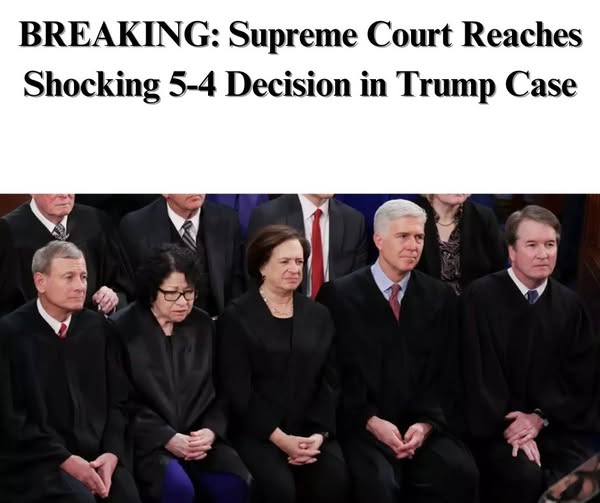
On Wednesday, a split Supreme Court denied the Trump administration’s appeal to maintain a freeze on billions of dollars in foreign aid that had been authorized by Congress.
The court did not specify a timeline for the release of the funds, thereby allowing the White House to continue contesting the matter in lower courts.
The decision was reached with a 5-4 vote. Although the order was unsigned, four conservative justices—Samuel Alito, Clarence Thomas, Neil Gorsuch, and Brett Kavanaugh—dissented.
The majority comprised Chief Justice John Roberts, Amy Coney Barrett, Elena Kagan, Sonia Sotomayor, and Ketanji Brown Jackson.
The majority opinion highlighted that since the court-imposed deadline for disbursing the funds had already lapsed, the lower courts should clarify the government’s obligations to comply with the temporary restraining order.
In a vehement dissent, Alito expressed his astonishment at the court’s ruling, which allows the lower-court judge to mandate the administration to release the foreign aid in question.
Justice Alito remarked, “A federal court possesses various mechanisms to address a party’s alleged inaction. However, the expansion of its jurisdiction is not among them.”
Although the decision was narrowly decided at 5-4, it was described as ‘extremely modest’ by Steve Vladeck, a CNN Supreme Court analyst and professor at Georgetown University Law Center.
He noted that the unsigned order does not mandate the Trump administration to immediately disburse up to $2 billion in foreign aid; rather, it simply allows the district court to enforce those payments, likely contingent upon a more detailed specification of the contracts that must be honored.
Vladeck further remarked that the dissent from four justices indicates a potential division within the Court on significant Trump-related cases that are forthcoming. The appeal reached the Supreme Court in a remarkably swift manner, which is unusual for the federal judiciary.
This case marks the second instance in which the justices are confronted with Trump’s efforts to centralize authority within the executive branch and significantly alter the government following his inauguration in January.
Central to this case is the billions in foreign aid from the State Department and the US Agency for International Development that Trump suspended in January as part of his strategy to reduce spending and align these agencies with his policy objectives.
Several nonprofit organizations that depend on this funding for global health initiatives and other programs have filed lawsuits, claiming that the administration’s actions overstepped Congress’s authority to regulate government spending and breached a federal statute governing agency decision-making.
In a statement submitted on Friday, these groups characterized the administration’s actions as having a ‘devastating’ effect, asserting that the funding ‘promotes US interests abroad and enhances – and in many instances, literally saves – the lives of millions worldwide.
The groups stated, “By doing so, it aids in preventing issues such as disease and instability abroad from reaching our borders.” US District Judge Amir Ali issued a temporary order on February 13, allowing the majority of the funds to continue flowing while he assessed the case.
Shortly thereafter, the plaintiffs contended that the administration was violating that order by obstructing the disbursement of funds, prompting Ali to instruct the Trump administration to allocate the contested funds by midnight on Wednesday.
Ali was appointed to the bench by President Joe Biden. In response, the Trump administration swiftly filed an emergency appeal to the Supreme Court just hours before the deadline, requesting a brief pause on the order.
The administration claimed to be making “substantial efforts” to evaluate payment requests and disburse the funds, but argued that it could not expedite the process sufficiently to comply with Ali’s timeline.
The plaintiffs expressed skepticism towards this rationale, asserting that a limited number of political appointees within the administration were “refusing to authorize essentially any payments.”
In a Supreme Court filing earlier on Friday, the groups stated that the government had not undertaken “any meaningful steps” to achieve compliance. On Wednesday, Roberts, acting independently, granted the administration a temporary reprieve by issuing an “administrative stay,” which paused the case to allow both parties to submit written arguments.
The chief justice is responsible for handling emergency matters arising from the federal appeals court in Washington, DC. Among the organizations contesting the freeze are the AIDS Vaccine Advocacy Coalition, a New York-based entity focused on accelerating HIV prevention, and the Global Health Council, located in Washington, DC, which represents various groups involved in health program administration.
The Trump administration disclosed in court documents that it is seeking to eliminate over 90% of the USAID foreign aid grants.
According to the administration’s filing, nearly 5,800 USAID grants were terminated, while more than 500 were preserved. The total value of the retained grants is estimated to be around $57 billion.
Furthermore, the government informed a lower court that approximately 4,100 State Department grants were also terminated, with about 2,700 being retained. The extensive funding freeze and review of billions in assistance have halted aid programs globally.
This situation coincides with the Trump administration placing a significant portion of USAID’s workforce on leave or terminating their positions. On Capitol Hill, Democrats expressed that the ruling indicates Trump’s authority to freeze spending is not absolute.
Rep. Gregory Meeks of New York stated that the funds had already been allocated and actions were underway, asserting that the Supreme Court made the correct decision, urging the administration to release the funds and allow contractors to proceed with their work.
Rep. Pramila Jayapal described the ruling as ‘very significant’ coming from ‘a Trump-influenced court,’ emphasizing that it reaffirms Congress’s power to allocate funds and the expectation that authorized work should be compensated.
When asked about her confidence in the resumption of payments, Jayapal expressed uncertainty but hoped the Trump administration would heed the Supreme Court’s decision.


